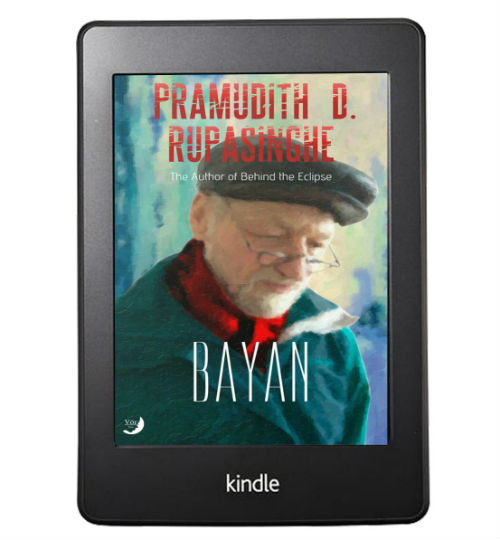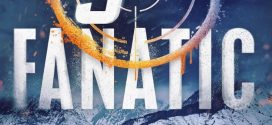Do you love reading? Are the books focused on reality interests you? Do you love to explore the culture and “way of living” of people who belong to a different geographic arena? If the answers are “yes”, then – Bayan – by Pramudith Rupasinghe is surely going to interest you.
| Book Title | : | Bayan |
| Author | : | Pramudith D. Rupasinghe |
| Publisher | : | Vör Press (9 June 2018) |
| # of Pages | : | 1582 KB; 213 |
| # of Chapters | : | 1582 KB; 40 |
| Purchase Link(s) | : |
Let us take a look at the cover page of Bayan.
This Is Here In For You
Book Cover:
When looking at the cover page, just remember that the book explores the story of an old man named Ivan.

The cover page plays a vital role in making the first impression of a book (or for that matter any media). And, more often, it influences reading decisions. At the same time, it is expected to represent the content of the book as well. The cover page, showing an Ukranian old fellow wearing a cap – is one of the most realistic representations of the story and its elements in the book. Of course, if the instrument – Bayan – was present on the cover page, it must have been even more attractive and faithful.
From my perspective, it is a moderately good cover page.
By the way, Bayan is a musical instrument that appeared in many Hindi films, for example:
https://www.youtube.com/watch?v=mj7mr6f2xOo
As far as I can recall, I have last witnessed it in Hindi Film – Hum Saath Saath Hain.
The Book And What I Think Of It:
Ivan is an aged man who has already seen the best of his life. He is a first-hand witness of communalism and its impact on the Soviet Union. The current generation may not know but USSR and USA were the representation of two different ideologies at their foundation. Of course, people know that communalism is at the foundation of USSR and USA was more of a capitalist at the core. But, there is more to that.
While America is considered as the land of opportunity and is developed (in the sense of modern nation-building) in the comparatively recent past. USSR on the other hand is a land of old cultures and how they are entangled with each other. Of course, with time, Russia and other countries got separated and the tapestry of cultures changed a little. But, as said, the foundation blocks of human nature don’t change with borders, you will find some roots overlapping each other :).
One of the biggest advantages of being a book lover is the way the door to witness various cultures are opened to you. Pramudith Rupasinghe is a Srilankan author and the canvas of the book is set up in Ukraine and Russian cultures. While reading the book, you will, not for a single page feel that it doesn’t explore the stuff in an authentic manner.
The way the author has explored the land, nature, people, their ways of living etc, will make you admire him for sure. You will also notice that the author himself is a nature lover. For example, the exploration of Vorskla river is so interesting that you start considering it a character of the book!
It appears as though he is on a voyage with his thoughts triggered by the sights across the waters.
You may find detailed explorations of natural elements in many books, but associating them convincingly with the human psyche is something I found quite interesting in this book. And, it is beautifully associated with the protagonist. In his own words:
Generations of birds, trees and every drop of water in the river Vorskla that has passed this place know the unuttered story of my life.
I am quite in ave of the talent of the author when he says (through one of the characters of the book):
Soil, not the tree, determines the taste of the fruit…
What a deep thought?! And, it is not the only one, you can find many fantastic one-liners in the book. Here is one more:
What time pushes cannot be pulled back.
Indeed. Here are some more interesting lines about nature:
Mother Earth is better than a new Moskva fridge, it is natural and it preserves nutrients.
It seemed as though his ears were deaf to human voices but tuned only to nature.
What “experience” can give you the best? Well, my answer would be “lessons to remember for a lifetime”. Ivan and other characters of book conveys so many life lessons, directly and indirectly.
Life is all about relationships, people and the memories they leave with us.
… a man without bonds is a breathing cadaver and a mind without memories is a pond without river.
As you can see in the above mentioned lines, the book talks about human nature in depth. The life became so fast these days that we started mimicking machines. You will find a lot of references about the shrinking “attention span” and other stuff. The author pinpoints this problem from a different perspective in this book:
Unfortunately, many people do not know where they are, and they live insensitive to their bodies and minds.
He also says:
Human feelings are like weather that changes without warning, just like the callously cold night at the very onset of autumn;…
These lines must have given you a fair idea of the quality of writing you can get in this book. Rather than talking about the story (for that I am adding book-blurb of the book below this segment), we at ThinkerViews love to quote spoiler-free (as much as possible) lines from the book exploring different aspects of literary attributes. This way, you yourself can check whether it suits your reading preferences.
Strong characters and their detailed exploration is one of the strengths of the book. While it is focused mainly on Ivan, other characters got their due. It is not an easy task to imagine a character who is more than 70 years old, belong to a totally different “way and place of living”, especially when you are a young fellow. The amount of research work done by the author to represent the situations and emotions associated with them is commendable.
Remember, if you looking for something to read, just to pass time, you may not find this book interesting. It is for those who love to read in a calm and composed state, by paying attention to the words and emotions they are trying to elaborate. In that sense, the book has a repeat-reading value.
The author has tried to use traditional yet popular names for the characters like Ivan, Nadiia, Victoria, Svetlana, Olga,… But, of course, many things may sound foreign (as they are) to you including names of people, places and other stuff (for example: marshrutka, Poltavska, fialki, vaselki, Russkaya). Indian readers, however, will surely connect to the word “chai”, though :).
You will also come across words like “liberalness” while reading the book. If you are an avid reader, you will notice that “Nadiia” is also referred as “Nadya” at places. You can also find words like “introverted” and “extroverted” in the book in lines like:
When sad you remain introverted, left alone. When happy you tend to be extroverted, you start sharing.
So, it is up to the reader, what he/she is trying to take away from the book and from which perspective he/she reading the book.
Each and every author wants to be “read” by the maximum number of readers. Why then Pramudith has penned down this book where the readers needs to be attentive? I think the following line might relate us to the psyche of the author.
On this bewildered earth where humans are trying to be aliens, I am unusual in many ways…
According to me, the book is not just a story of a person, or an exploration of a culture or even country. The story ends at “2067-01-13, Pervomaysk, Sumskaya Oblast” (see YYYY-MM-DD date format, that is even used in Japan and many database systems) and it talks about human emotions. So, it is a story for everyone to read. Here is one of the most candid segments of the book, that talks about “Emotional Intelligence”:
The heart does not understand the language of the brain, nor does the brain feel that of the heart. They are made for two different purposes; but, a human being is the most developed animal on the earth, he has to blend these together, which is emotional intelligence.
If I have to summarize the message, the book is trying to convey, I will settle for this line:
Positivity is not a luxury, but a basic need.
Book Blurb:
In the serene tempo of classical Soviet literature charmingly merged into modernity, Bayan is a unique blend from among the work of Pramudith D Rupasinghe.
Bayan begins in the sunny Ukrainian summer and ends with a hidden, deeply meaningful message. It is not only the story of a strange, bearded old man who finds solace and a soulmate of sorts, in a traditional string instrument, while facing a common narrative of his era; it is a commentary on life, and a celebration of the ultimate coming of age.
It juxtaposes the failure of physical strength and faculties to the accumulation of immense emotional fortitude. It lulls you into feeling safe in spite of the passing of transient seasons, the waning of political ideologies and the inevitable disintegration of the corporeal being.
Bayan tells about changing world`s order, revolutions and the ravages of time, the music of life will go on.
Summary:
The book requires readers’ attention and is heavy at places. If you love meaningful reading, you will enjoy reading it.
ThinkerViews Rating:
Around 7.5 out of 10.
Quick Purchase Links:
Over To You:
If you already have read the book do share your remarks and thoughts via comments below. Does this review help you in making your decision to buy or read the book? Do not forget to share this article with your friends over various social networks via Twitter, Facebook and others. And yes, you may like to subscribe to our RSS feeds and follow us on various Social networks to get latest updates for the site to land right in your mail box.
 ThinkerViews – Views And Reviews Personal views and reviews for books, magazines, tv serials, movies, websites, technical stuff and more.
ThinkerViews – Views And Reviews Personal views and reviews for books, magazines, tv serials, movies, websites, technical stuff and more.



